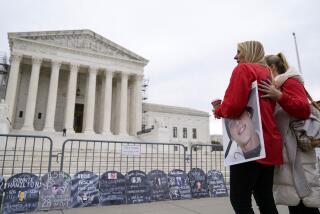Column: Is the Sandy Hook massacre the real impetus behind the Remington Arms bankruptcy?

- Share via
Remington Outdoor Co., the owner of the century-old Remington gun company and other firearms manufacturers, made crystal clear that financial strains were behind its bankruptcy filing Monday.
The company said that it had ramped up production and borrowing in 2016 based on expectations that a Democratic administration in the White House hostile to gun rights would drive sales through the roof in 2017 and beyond. Instead, Donald Trump won the presidency, and expectations of higher sales evaporated.
But factors related to firearms liability law suggest that more than economics may be at work. Specifically, Remington — indeed, the entire firearms industry — is on tenterhooks waiting for a potential landmark ruling from the Connecticut Supreme Court.
There are a lot of ways organizations can use bankruptcy to maneuver around the tort system.
— Georgetown Law Professor Heidi Li Feldman
The court has been expected to rule any moment on assertions that Remington’s reckless sales policies outweigh its protection from lawsuits under federal law. That’s the position taken by parents of children killed by a Remington-made Bushmaster AR-15 rifle wielded by Adam Lanza at Sandy Hook Elementary School in Newtown, Conn., on Dec. 14, 2012.
The court’s ruling, however, is likely to be stayed during the bankruptcy, which could last for months. That could give the company some breathing room to try reaching a negotiated settlement with the parents that removes the threat to federal immunity. That’s the view of Heidi Li Feldman, a tort law expert and legal theorist at Georgetown Law School.
“There are a lot of ways organizations can use bankruptcy to maneuver around the tort system,” Feldman told me. Typically, the goal is to force a financial settlement on plaintiffs at pennies on the dollar in a settlement. “This doesn’t look like that,” she says. Instead, she speculates, Remington may fear that “the plaintiffs’ case has legs, and it’s very bad for Remington.”
The issues before the Connecticut court involve the Protection of Lawful Commerce in Arms Act, a measure championed by the National Rifle Assn. and signed into law by President George W. Bush in 2005. PLCAA gives gun manufacturers broad immunity from liability when their products are used in a crime. The NRA called passage of PLCAA “an historic victory”; gun control advocates see it as a measure that “allows gun companies to profit off supplying criminals and from selling guns without feasible, life-saving safety devices,” to cite the words of the Brady Campaign to Prevent Gun Violence.
PLCAA doesn’t absolve gunmakers of liability in all circumstances. There are carve-outs for “negligent entrustment” and for violations of “predicate statutes.” The first covers cases in which the gunmaker sold a weapon when it knew or should have known that the sale “involves unreasonable risk of serious injury.”
The parents contend that the Connecticut Unfair Trade Practices Act, which forbids improper marketing, is a predicate statute that was violated when Remington “marketed a military weapon designed to inflict mass casualties to an untrained civil population, specifically targeting violence-prone young men.”
A lower state court threw out the parents’ lawsuit in 2016, citing PLCAA. But they appealed to the state Supreme Court, which held oral arguments at the end of last year. The parents’ position, Feldman says, “is not a slam-dunk winner by any means; but neither is it crazy.”
A ruling in favor of the parents would open a major hole in PLCAA protection exposing gun manufacturers to liability in many cases of firearms violence, by holding that “negligent entrustment” covered the sale of an assault-style weapon to a civilian populations, Feldman says.
Such a ruling also would allow the parents to start discovery. That process could unearth reams of internal communications that could be embarrassing if they indicated, say, that Remington deliberately structured its marketing to feed a market of young adults harboring fantasies of mass mayhem.
Remington Chief Financial Officer Stephen P. Jackson Jr. made a strong case in the bankruptcy filing that the company was driven to its knees by the economics of gun sales in 2017. Remington not only found itself with millions of dollars in excess inventory last year, but stiff competition from other gunmakers that also had ramped up manufacturing in anticipation of a sales boom under a continued Democratic regime. Discounting and costly promotional marketing swept through the entire industry. Following the shooting in Parkland, Fla., once-reliable retailers, including Dick’s Sporting Goods and Walmart, either placed new restrictions on gun sales or abandoned them entirely.
Still, the timing of the bankruptcy filing lends credence to Feldman’s theory. Remington originally announced its plans to file for bankruptcy on Feb. 12. But it delayed the filing after the killing of 17 students and teachers at Marjory Stoneman Douglas High School in Parkland on Feb. 14, apparently reasoning that the optics of seeking court protection days after a mass shooting would look just too putrid.
But delaying the filing any further now would increase the risk that the Connecticut Supreme Court would rule before the bankruptcy law’s automatic stay of civil court proceedings could be imposed.
Lawyers for the parents expressed confidence Monday that their lawsuit will eventually proceed: “We do not expect this filing to affect the families’ case in any material way.” In its bankruptcy filing, Remington acknowledged that the parents’ case remains alive.
It’s possible that the company may try to settle the case by committing to future marketing and manufacturing restrictions that would satisfy the plaintiff families and remove the threat of a widened PLCAA loophole. But sources say there have been no discussions between the parents and the company in that vein thus far.
Keep up to date with Michael Hiltzik. Follow @hiltzikm on Twitter, see his Facebook page, or email michael.hiltzik@latimes.com.
Return to Michael Hiltzik’s blog.
More to Read
Inside the business of entertainment
The Wide Shot brings you news, analysis and insights on everything from streaming wars to production — and what it all means for the future.
You may occasionally receive promotional content from the Los Angeles Times.











